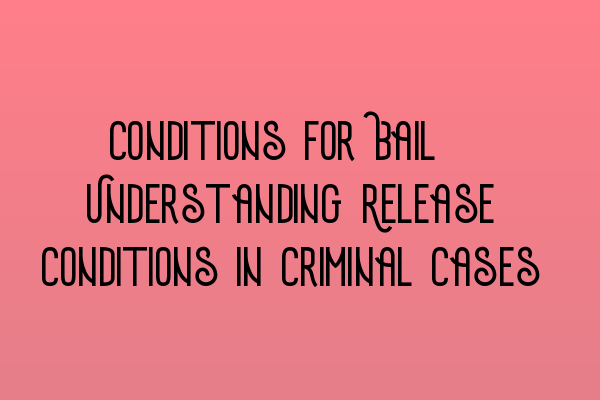Conditions for Bail: Understanding Release Conditions in Criminal Cases
When it comes to criminal cases, many individuals may find themselves facing the possibility of being released on bail until their trial. Bail serves as a legal arrangement whereby a person is released from custody but remains under specific conditions until their trial or hearing. Understanding the release conditions for bail is crucial to ensure compliance with the law and for the best chance of a successful outcome.
What Are Bail Conditions?
Bail conditions are rules imposed by the court that individuals must follow while released on bail. These conditions are set to monitor and regulate the behavior and actions of the accused person during the interim period before their trial. Failure to comply with these conditions may result in the revocation of bail and the accused person being remanded in custody until their trial.
Types of Bail Conditions
Bail conditions can vary depending on the nature of the offense, the individual’s criminal history, and the perceived risk they may pose to the community or potential witnesses. Some common types of bail conditions include:
- Residence Condition: The accused must provide the court with a valid address where they will reside during the period of bail.
- Reporting Condition: The accused may have to regularly report to a designated police station to provide updates on their whereabouts and activities.
- Curfew Condition: The accused may be required to stay indoors during specified hours, typically overnight.
- Non-Contact Condition: The accused may be prohibited from contacting certain individuals, such as potential witnesses or co-defendants.
- Travel Restriction Condition: The accused may be restricted from leaving a specified area or the country without prior permission from the court.
- Weapon Surrender Condition: The accused may be required to surrender any firearms or weapons in their possession.
Importance of Complying with Bail Conditions
Complying with bail conditions is of utmost importance for individuals released on bail. Failing to adhere to the set conditions can have severe consequences, including:
- Bail Revocation: If an accused person breaches their bail conditions, the court may revoke their bail and order their immediate arrest.
- Additional Charges: Breaching bail conditions may result in additional criminal charges being brought against the accused.
- Impact on Trial: Non-compliance with bail conditions can negatively impact the outcome of the trial, as it may be viewed as a lack of respect for the legal process.
Therefore, it is crucial to consult with an experienced criminal defense solicitor who can guide you through the bail process and ensure you understand and comply with the set conditions.
Seek Legal Advice for Bail Conditions
Understanding and complying with bail conditions can be complex, and seeking legal advice is highly recommended. At SQE Criminal Law & Practice Law UK, our team of experienced criminal defense solicitors specializes in bail matters and can provide expert guidance tailored to your specific case.
If you require assistance with understanding bail conditions or need representation in a criminal case, contact us today to schedule a consultation. We are here to protect your rights and help navigate the legal complexities involved.
Related Articles:
SQE 1 Practice Exam Questions,
SQE 1 Practice Mocks FLK1 FLK2,
SQE 2 Preparation Courses,
SQE 1 Preparation Courses,
SRA SQE Exam Dates
